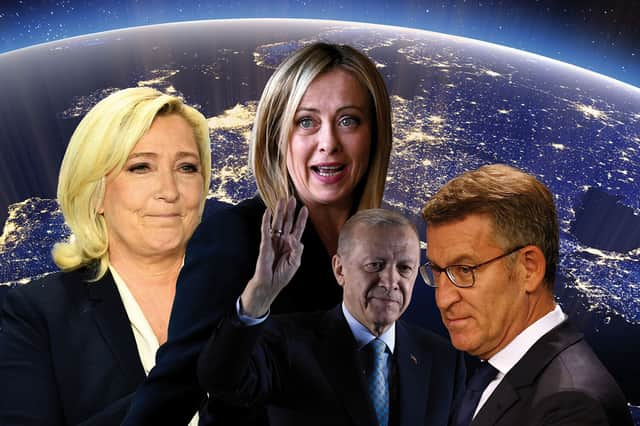Is right-wing populism on the rise again in Europe?


The recent election in Turkey felt like it could have been a tipping point in the nation's history, with Recep Tayyip Erdoğan's opponent Kemal Kılıçdaroğlu and his centre-left party CHP forcing him into a run-off vote to decide the presidency.
But the incumbent Erdoğan prevailed, and avoided a devastating result for both his leadership and his AKP ruling party.
Advertisement
Hide AdAdvertisement
Hide AdWhen I spoke to Turkey expert Professor Howard Eissenstat from St Lawrence University and the Middle East Institute, he explained that this election was special for one reason. It gave the left what felt like one last chance to defeat Erdoğan’s right-wing, authoritarian regime.
“It seems like the last best opportunity for Turkey to reverse Erdoğan's authoritarianism, to reclaim Turkey as a contested electoral system and to bring up the control of the AKP over the bureaucracy of the media,” he told me prior to the run-off vote. “For the Turkish opposition, this was seen as the last best chance to step away from the brink.”
But Erdoğan’s win, although slight at 52.12% of the vote, seems to have quelled some of the prevailing talk that populism may now be on the decline.
This pattern of the rise in right-wing populist politics seems to have gained traction in much of Europe. While the US and Brazil ejected Donald Trump and Jair Bolsonaro from power, countries like Italy have emphatically welcomed a newer, more conservative, more right-wing government.
Advertisement
Hide AdAdvertisement
Hide AdGiorgia Meloni, the prime minister of Italy, made history as the first female leader of the country. But her election heralded in a new era of anti-LGBT sentiment and religious-led policies.
In Spain, Prime Minister Pablo Sánchez’s Spanish Socialist Workers’ Party was resoundingly defeated in recent regional and municipal elections. Sánchez has since called a snap election for July after significant gains were made by the conservative People’s Party, who used the elections as a 'de facto' referendum on his left-wing alliance. The People’s Party looks set to secure its strong position by making deals with the Vox Party, which has been described as far-right by both academics and journalists in the country.
Countries such as Poland, Hungary, Austria, and Sweden have also installed such populist right-wing governments since 2016, with France also seeing a huge rise in support and a near-win for far-right parties such as Le Pen’s National Rally. But why has Europe seen this rise of the right in recent years?
It could be a combination of factors. In the age of social media, misinformation and disinformation has thrived and festered on the internet, especially during the Covid lockdown when we spent most of our lives online. Even some traditional media outlets are heavily controlled in parts of Europe - for example, 90% of Turkish media organisations are owned by either the government directly or businesses with close ties to the government - with coverage and criticism restricted in some cases.
Advertisement
Hide AdAdvertisement
Hide AdThe migrant crisis of 2015 has had ramifications almost a decade later, with anti-migrant sentiment growing since that year in nations like France and Germany. The EU’s technocratic and overarching hand of power across the continent has given rise to populist campaigns claiming to put the power back in the hands of citizens - much akin to the rhetoric of the Brexit campaign in the UK in 2016.
In the same year, Trump’s election to the White House shocked the world, with his extreme policies and outrageous persona. The dark horse in the 2016 US election was the victor, leading the way for right-wing parties and campaigns across Europe to learn from the way he gained support with those who felt disenfranchised and left behind - a boost in populism in Europe was predicted by analysts at the time of his victory.
But while Trump has been ousted (for now), the reverberations around Europe can still be felt. It’s just a matter how long the right-wing will be able to maintain a grip on European seats of power.
Comment Guidelines
National World encourages reader discussion on our stories. User feedback, insights and back-and-forth exchanges add a rich layer of context to reporting. Please review our Community Guidelines before commenting.
